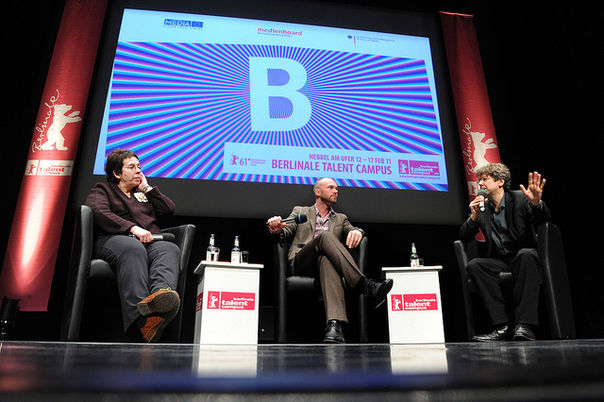Breaking Schemes
Documentary filmmakers Andres Veiel and Heddy Honigmann meet Talents for the “Too Good to Be True: Directing Reality” panel.

Heddy Honigmann, moderator Matthijs Wouter Knol and Andres Veiel
From the moment a documentarian begins filming reality, he is also altering it. When people become aware of the presence of a camera, they adapt their postures and their attitudes. The act of framing something is itself an exclusion. Reality isn’t really being reproduced, it is being fractured for the creation of something different. When Flaherty did MAN OF ARAN, he asked some fishermen to hunt a whale for the first time in their lives, in order to emulate the ancient inhabitants of the Aran islands. This simple truth doesn’t seem so obvious to many critics who question deliberate stagings and other artifices that alter the “purity” of a documentary.
Two filmmakers who alternate between documentary and fiction, taking the tools acquired in one discipline and pouring them into another, spoke about their experiences on the Berlinale Talent Campus forum “Too Good to Be True: Directing Reality”. Andres Veiel, who has made several documentaries in the past, presents his first fiction film, IF NOT US, WHO, at the Berlinale. Heddy Honigmann has a vast filmography which includes METAL AND MELANCHOLY, O AMOR NATURAL and GOOD HUSBAND.
Both filmmakers showed clips from their films and commented on the relationship and treatment of “actors.” In OBLIVION Honigmann interviewed ordinary Peruvian people speaking about the relevant things that changed their lives – coups d’etat, revolutions, financial crises – and she doesn’t hide the fact that she wrote the lines, inspired by previous conversations, spoken by a waiter in front of the camera. Veiel created an even more staged situation filming ADDICTED TO ACTING, when he made wanna-be actors and actresses perform a scene of their choice in front of their parents. But in shooting those atypical performances, he captured reactions that couldn’t be more spontaneous and reliable. And, Veiel added, if there was no conflict situation in those scenes, he would create one, as a way of opening up dramatic possibilities.
The theme of “shaping reality” in documentary filmmaking is debatable and complex. But many unique and startling scenes in documentaries wouldn’t exist if those filmmakers hadn’t moulded reality in at least a small way.


301 Moved Permanently